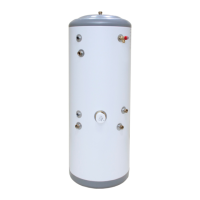Page 20 Section 6: Commissioning, Draining Down and Safety
! NOTE !
Commissioning details should be entered in the
commissioning and service log at the back of these
instructions.
6.1 FILLING THE CYLINDER
! CAUTION !
Before lling the cylinder check that the immersion heaters
have not loosened in transit. Tighten as necessary using
a shaped spanner. Stillsons or pipe grips should not be
used.
1. Ensure that all connections are fully tightened.
2. Ensure that the service valve in the cold water supply is
closed.
3. Open all hot water taps supplied by the cylinder.
4. Slowly open the service valve in the cold water supply.
5. Continue to ll the cylinder until water ows from all taps
6. Open the service valve fully and close all the hot taps.
7. Allow system to stabilise for ve minutes.
8. Open each hot water tap in turn to expel air from the system
pipe work.
9. Check for leaks.
10. Manually operate Temperature and Pressure Relief Valve
(refer to Figure 2-2), to ensure free water ow through
discharge pipe. (Turn knob to left).
11. Heat the water to chosen temperature and then close the
service valve.
12. Drain the cylinder to ush out any ux/solder from the
installation process. Refer to Section 6.2 below.
13. Re-ll the cylinder – as described above.
14. Re-heat cylinder to the required temperature and re-check for
leaks.
6.2 DRAINING DOWN
1. Switch o the electrical power to the immersion heater
(important to avoid damage to the element).
2. Switch o the heat pump (or boiler).
3. Turn o the cold water service valve (or stop cock).
4. Open all hot water taps.
5. Open drain cock at the bottom of the cylinder to drain unit
down. Refer to Figure 2-2.
6.3 IMMERSION HEATER SAFETY CUT-OUT
The immersion heater incorporates an independent non self-
resetting over temperature cut-out device to prevent excessive
water temperatures. Refer to Section 5.3 for further details.
The safety cut-out will operate if:
a. The wiring is incorrect.
b. The immersion heater thermostat or cylinder thermostat fails.
c. Thermostat is set too high.
To reset the safety cut-out:
1. Unscrew and remove the nut holding the immersion heater
cover in place.
2. Remove the immersion heater cover.
! WARNING !
Before removing the immersion heater cover, to either
reset the safety cut-out or check/alter the thermostat
setting, ensure that the electrical supply is isolated.
3. The safety cut-out reset pin is positioned to the side of the
control knob (indicated by a triangle with the words ‘bipolar
safety’ above). Refer to Figure 5-1.
4. If the cut-out has operated, the reset pin will be pushed
upwards (to be level or slightly above the cover).
5. Wait until the temperature has fallen suciently.
6. Investigate and identify the cause of the cut-out operation
and rectify the fault.
7. Press in the reset pin (to its normal operating position) to
reset the cut-out. Use hand pressure only with a suitably
sized implement.
8. Ret the immersion heater cover correctly and secure in
position with retaining nut.
9. Switch the mains electricity supply back on.
If the problem persists, please contact your installer.
6.4 COLD WATER DISCHARGE FROM
TUNDISH
There are two reasons why cold water will discharge from the
tundish:
1. The pressure reducing valve has malfunctioned (This will
cause a large volume of water to ow through the tundish).
2. The Expansion relief valve is letting by (This will cause a very
low volume of water to ow through the tundish).
In both cases, identify the defective component and replace. All
repairs must be carried out by a competent person.
6.5 HOT WATER DISCHARGE FROM TUNDISH
There are four reasons why hot water will discharge from the
tundish:
1. Thermal cut-out has malfunctioned.
2. The control thermostat has malfunctioned.
3. The T & P valve is letting by.
4. The expansion vessel has failed or lost its charge.
In all cases, should a repair be necessary, the work must be
carried out by a competent person.
Isolate the cylinder from all electrical supplies before commencing
maintenance work.
6 COMMISSIONING, DRAINING DOWN AND SAFETY

